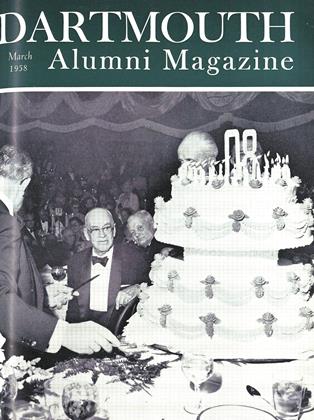By Foster ErwinGuyer '06. New York: Bookman Associates,1957. 247PP. $4.00.
By the time Chretien de Troyes appeared on the scene of medieval French literature in the last half of the twelfth century, the reading public — or rather the listening public which gathered around as the traveling minstrel sang his tales of the knights of old - was beginning to grow tired of the heroes of the epic poems, of which the Song of Roland was the best known. These epic figures were actually very tough characters: they treated their women almost as roughly as they did their enemies; most of their waking hours were filled with the sound of battle: bloody, brutal, and always victorious.
When the public was ready, Chretien appeared with a completely new style, the romance. Its success was enormous: here were chivalrous knights who adored their ladies, who had time for the leisurely pursuit, who even talked a gentler and far more poetic language. Chretien de Troyes did not invent the romance all by himself; the work of his predecessors and contemporaries has been studied by the late Professor Guyer in his Romance in the Making, published in 1954. But Chretien's romances were superior to all others and his influence has been unequalled.
Professor Guyer, whose death last November saddened the Dartmouth community, tells us just how widespread this influence has been in Italy, Spain, France, and England. The volume is an able presentation of the patent rights which Chretien might claim in the modern novel. In the early chapters, Professor Guyer analyzes the various works which Chretien wrote. He then traces Chretien's influence upon such novelists as these: Chaucer, Shakespeare, Rousseau, Sir Walter Scott, Victor Hugo, Alexandre Dumas, Balzac and Tennyson.
Did Chretien de Troyes actually invent the novel? There may be some who will dispute his claims. Nevertheless, there are few elements in the modern novel that were not also present in Chretien's romance. It may perhaps be significant that the French continue to use the word roman for our "novel." In any case, Professor Guyer's volume will serve as a useful introduction to Chretien de Troyes. It will also serve as a reminder to the novelist of the twentieth century of the debt which he owes to this "inventor" of the twelfth.
 View Full Issue
View Full Issue
More From This Issue
-
 Feature
FeatureThe State of Our Purposes ... and Vice Versa
March 1958 -
 Feature
FeatureA Spot of Green at Knob Lake
March 1958 By ALAN COOKE '55 -
 Feature
FeatureA BIG NIGHT AT THE WALDORF
March 1958 -
 Feature
FeatureAlumni Council Has Record Attendance
March 1958 -
 Class Notes
Class Notes1918
March 1958 By ERNEST H. EARLEY, W. CURTIS GLOVER, RICHARD P. WHITE -
 Class Notes
Class Notes1930
March 1958 By RICHARD W. BOWLEN, WALLACE BLAKEY, JOHN F. RICH
WILLIAM R. LANSBERG '38
Books
-
 Books
BooksAlumni Publications
February 1935 -
 Books
BooksAlumni Articles
JUNE 1971 -
 Books
BooksA PRIVATE PARTY.
March 1954 By HENRY M. DARGAN -
 Books
BooksYACHTING IN NORTH AMERICA.
March 1949 By Herbert F. West '22. -
 Books
BooksYANKEE KINGDOM.
July 1960 By HERBERT W. HILL -
 Books
BooksGOVERNMENT, BUSINESS AND VALUES,
October 1943 By WILLIAM A. Carter '20



